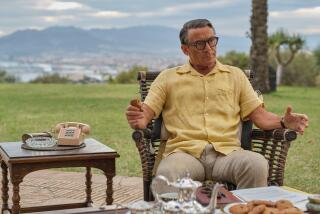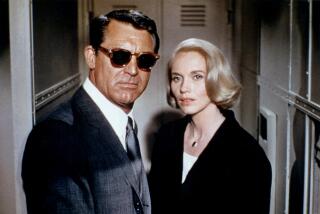Vintage DVDs: Cary Grant’s ‘None But the Lonely Heart’
- Share via
Cary Grant once said that “I pretended to be somebody I wanted to be, and finally, I became that person. Or he became me.”
Today, of course, Grant is remembered as the epitome of the suave gentleman, an image he carefully cultivated, but in 1944’s “None But the Lonely Heart,” he played a very different kind of man — the Cockney ne’er do well Ernie Mott, a role that allowed him to reach back to his English working-class roots. He considered it one of his finest performances; his portrayal earned Grant his second lead actor Oscar nomination.
This week, Warner Archive issued a newly remastered DVD edition of the film, which attracted audiences when it was originally released but has since faded from view. It rarely shows up on TV or in revival theaters (it was released on VHS in 1995), but the movie, adapted and directed by Clifford Odets from Richard Llewellyn’s novel, remains a testament to Grant’s innate talent.
Born in Bristol in 1904 as Archibald Alexander Leach to impoverished parents, Grant was only 9 when his mother was institutionalized. Five years later, he was working with the Bob Pender comedy troupe, where he danced, performed acrobatics and even learned to stilt-walk.
He got only two chances to revisit his past on screen. He was jovial fun in the 1935 Katharine Hepburn-starrer “Sylvia Scarlett” as a Cockney “gentleman adventurer.” But he’s a revelation in “None But the Lonely Heart,” offering up a performance of depth, complexity and emotion.
As the film opens, Grant’s Mott is returning to the poor London East End street where he grew up. His mother ( Ethel Barrymore), who owns and operates a second-hand store, is angry that he has wasted his life without any direction and gives him an ultimatum — put down roots or leave forever.
Furious, Ernie plans to leave in the morning with his trusty bull terrier Nipper — until he learns that his mother is dying of cancer. He decides to stay and help her.
Jane Wyatt plays his neighbor Aggie, a cellist who has long loved Ernie, and June Duprez is Ada, the love of his life who was once married to a vicious and still jealous gangster (George Coulouris).
The production spared no expense. The film’s 800-foot East End London road set was, according to the Hollywood Reporter, the largest and most complete indoor set ever constructed at that time, expanding across two sound stages.
RKO went to great lengths to obtain the services of Barrymore — the studio closed the play in which she was appearing on Broadway, “The Corn Is Green,” for two weeks while she was making the movie, paying all salaries and expenses of Barrymore’s costars and the play’s crew.
Odets, the author of some of the seminal plays of the 1930s, including “Waiting for Lefty” and “Awake and Sing!,” penned a beautiful script, which is matched by his sensitive, sure-handed direction. Odets would direct only one other movie, 1959’s “The Story on Page One,” which he also wrote.
Grant supposedly never took awards seriously and failed to attend the 1945 Oscar ceremony. He lost the Academy Award to Bing Crosby for “Going My Way.” But according to friends, Grant was disheartened that he didn’t win the statuette, because he considered his portrayal of Ernie Mott to be the best of his career. And he was right.
susan.king@latimes.com
More to Read
Only good movies
Get the Indie Focus newsletter, Mark Olsen's weekly guide to the world of cinema.
You may occasionally receive promotional content from the Los Angeles Times.











